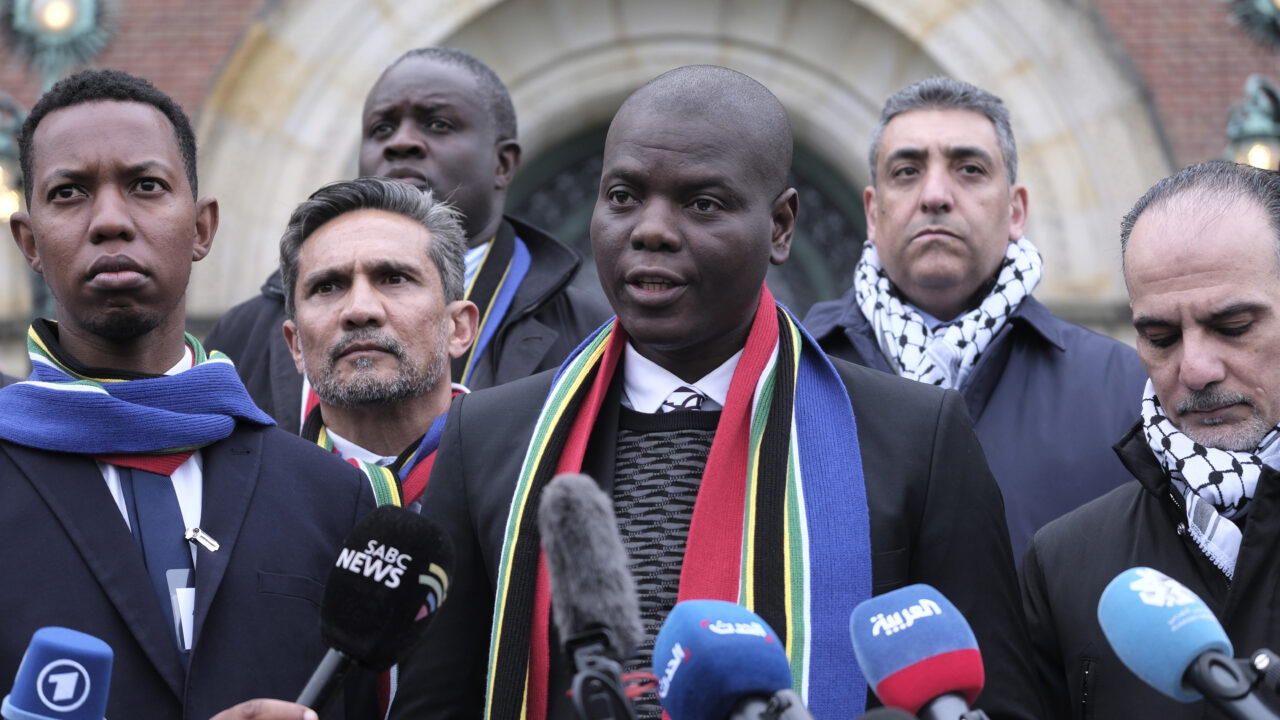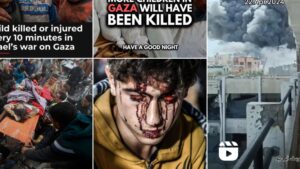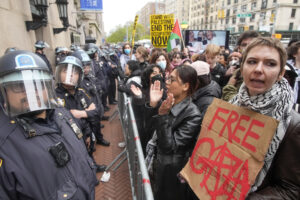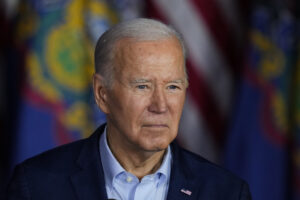How South Africa Lost Its Genocide Case Against Israel
The International Court of Justice has declined to order a ceasefire in Gaza. South Africa’s legal team is partly to blame. South Africa's Minister of Justice and Correctional Services Ronald Lamola, center, and Palestinian assistant Minister of Multilateral Affairs Ammar Hijazi, right, address the media outside the International Court of Justice in The Hague, Netherlands, Thursday, Jan. 11, 2024. (AP Photo/Patrick Post)
South Africa's Minister of Justice and Correctional Services Ronald Lamola, center, and Palestinian assistant Minister of Multilateral Affairs Ammar Hijazi, right, address the media outside the International Court of Justice in The Hague, Netherlands, Thursday, Jan. 11, 2024. (AP Photo/Patrick Post)
The verdict is in. On Jan. 26, the International Court of Justice ordered Israel to abide by six “provisional measures” — the rough equivalent of a temporary restraining order — in its war against Hamas. The ruling requires Israel to “take all measures within its power to prevent the commission of acts” of genocide “in relation to Palestinians in Gaza.” The ruling also requires Israel to prevent and punish individuals who make public statements inciting genocide; preserve evidence related to allegations of genocide; improve the provision of humanitarian aid to the embattled enclave; and report back to the court in one month on steps it has taken to comply with the ruling.
These are all important measures. Under both the U.N. Charter and the ICJ’s founding statute, they are considered legally binding. But they do not include the primary item of relief sought by South Africa — that Israel immediately suspend its military operations. Seen in this light, South Africa’s case must be deemed a failure.
International courts are different from their domestic counterparts. But if you’re looking for an analogy to the American legal system, you can think of South Africa’s legal team as a district attorney’s office that charges a defendant with premeditated murder but winds up with a conviction for involuntary manslaughter, a suspended jail sentence and assorted conditions of probation.
Speaking after the ruling to reporters on the steps of the Peace Palace, where the ICJ sits in The Hague, Netherlands, South Africa’s Foreign Minister Naledi Pandor did her best to portray the decision as a triumph tantamount to a cease-fire order. “How do you deliver humanitarian aid without a cease-fire? How do you provide water, access to energy? How do you ensure that those who are injured have health care and so on?” she asked. “Without a cease-fire, not one of these things can be done.”
Unfortunately, outside the world of political spin, the war continues, and despite ongoing diplomatic efforts to pause the fighting, both Hamas and Israel seemingly remain committed to battle to the bitter, bloody end.
Why did South Africa’s demand for a cease-fire fail?
The ruling requires Israel to “take all measures within its power to prevent the commission of acts” of genocide “in relation to Palestinians in Gaza.”
The ICJ is a Western institution, and some studies suggest that its judges tend to vote in the interests of their home countries, reflecting an overall bias against developing nations. The current court, however, consists of 15 jurists from the United States, Somalia, China, Slovakia, France, Morocco, Brazil, Uganda, India, Jamaica, Australia, Russia, Lebanon, Japan and Germany, and can hardly be seen as pro-Israel. In addition to the court’s permanent members, both South Africa and Israel were permitted to appoint one ad hoc judge each to participate in the case, creating a diverse panel of 17 judges that heard oral arguments from South Africa on Jan. 11 and from Israel the following day.
South Africa’s failure is all the more egregious given the low standard of proof that applies at the initial phases of adversarial proceedings before the ICJ. As the court’s decision explains, at the provisional-measure phase of the case, South Africa, as the Applicant or moving party, did not have to prove conclusively that Israel had committed genocide, but only had to make a “prima facie” showing that that court had jurisdiction to hear the case under the 1948 Convention on the Prevention and Punishment of the Crime of Genocide (which both South Africa and Israel have signed) and that its claims were “plausible.” A more definitive showing will be required at a later date when a full trial on the merits is calendared and conducted.
A better explanation for the failure is a series of unforced litigation errors by South Africa’s legal team, which included several seasoned experts on international law. The first of these involved the flaw of “overcharging,” an abuse common among American prosecutors seeking maximum punishment and dramatic effect that sometimes backfires with juries. Instead of keeping to the allegations of genocide from Oct. 8 forward, South Africa’s advocates sought to “contextualize” Israel’s military operations as the outgrowth of its “75-year-long apartheid, its 56-year-long belligerent occupation of Palestinian territory and its 16-year-long blockade of Gaza.”
Such a broad context approach may play well on social media, but not in the courtroom, where the approach fed directly into Israel’s counter-narrative, made with great impact during its oral arguments, that South Africa was acting as a proxy for Hamas seeking to delegitimize its very existence as an independent nation. As the court’s decision indicates, it focused its ruling solely on the “immediate context” of Hamas’ Oct. 7 attack on Israel and Israel’s response.
South Africa’s second big mistake was its unwise refusal to acknowledge Israel’s right to self-defense. Oxford University law professor Vaughn Lowe, a king’s counsel of the highest standing bearing a physical likeness to John Mortimer’s fictional Horace Rumpole, went so far as to argue that as an occupying power, Israel had no right to self-defense whatsoever in Gaza.
Lowe’s declamations went over like a lead balloon, highlighting a third unforced error by South Africa’s advocates — that in their zeal to win, they allowed themselves to be easily out-lawyered by their opponents. Among the points made by Tal Becker, the legal adviser for Israel’s Foreign Ministry who opened Israel’s oral arguments on the second day of the hearing, was that Lowe had taken exactly the opposite position in a 2005 study published by Chatham House, an influential international-affairs think tank, in which he wrote:
The source of the attack, whether a state or non-state actor, is irrelevant to the existence of the right” [to self-defense]. “Force may be used to avert a threat because no-one, and no state, is obliged by law passively to suffer the delivery of an attack.
Becker’s rejoinder clearly resonated with the judges, who, in addition to the provisional measures imposed on Israel, concluded:
The Court deems it necessary to emphasize that all parties to the conflict in the Gaza Strip are bound by international humanitarian law. It is gravely concerned about the fate of the hostages abducted during the attack in Israel on 7 October 2023 and held since then by Hamas and other armed groups, and calls for their immediate and unconditional release.
But of all the unforced errors committed by South Africa, the most serious was its failure to join Palestine as a party to the case. The ICJ has no jurisdiction over non-state actors like Hamas, but since 2018, Palestine has been recognized as a state entitled to appear before the court with legal jurisdiction over both the West Bank and Gaza. Whatever South Africa’s reasons for deciding to proceed alone, Palestine’s absence meant that any cease-fire order would be unilateral and apply only to Israel. That limitation in the end proved unacceptable to the court.
Where do we go from here? The next step requires Israel to file a progress report with the ICJ in late February. Depending on the nature of the report, the case will then enter a long phase akin to the discovery and law-and-motion process in American courts. This could take years to complete before a full trial is held.
In the meantime, the International Criminal Court, also located in The Hague, has opened an investigation into both Hamas and Israel. Unlike the ICJ, it has the power to indict, arrest, try and imprison war criminals and perpetrators of genocide. Last March, the ICC issued an arrest warrant for Vladimir Putin. A similar fate may well await Israel’s Bibi Netanyahu and Hamas’ Yahya Sinwar, along with many of their war-mongering and lawless cohorts.
Your support matters…Independent journalism is under threat and overshadowed by heavily funded mainstream media.
You can help level the playing field. Become a member.
Your tax-deductible contribution keeps us digging beneath the headlines to give you thought-provoking, investigative reporting and analysis that unearths what's really happening- without compromise.
Give today to support our courageous, independent journalists.






Just realized that #85 on page 26 was emphasized in your article. Very few in the media have even mentioned it.
I am trying to find the other two conversations and would like to remove my prior comment since it was made before I noted that you had addressed it in the article.
What does #85 on page 26 of the ICJ Order of 26 Jan 2024 really mean?
85. The Court deems it necessary to emphasize that all parties to the conflict in the Gaza Strip are bound by international humanitarian law. It is gravely concerned about the fate of the hostages abducted during the attack in Israel on 7 October 2023 and held since then by Hamas and other armed groups, and calls for their immediate and unconditional release.
I simply cannot believe that this analysis is that SA lost, simply because the word ceasefire doesn't appear in the courts resounding declaration that SA proved genocide was plausibly taking place and that literally every argument Israel made was found wanting and ignored. it was 15 to 2, even the American judge found in favor of South Africa and as you point out there were well understood technical reasons "ceasefire" wouldn't be in the judgement....
I simply cannot believe that this analysis is that SA lost, simply because the word ceasefire doesn't appear in the courts resounding declaration that SA proved genocide was plausibly taking place and that literally every argument Israel made was found wanting and ignored. it was 15 to 2, even the American judge found in favor of South Africa and as you point out there were well understood technical reasons "ceasefire" wouldn't be in the judgement. Not joining Palestine was strategic and probably smart - Palestine could have invoked the convention in the first place - they didn't. one must ask why - the answer isn't flattering to the PA. South Africa won this by a mile
You are difficult to follow, Bill. And I am much more convinced by Craig Mokibahr and Craig Murray in their pointing out that the almost unanimous verdict was a tremendous victory due to the fact that many of the accusations brought forth by SA was repeated by the court as their statements and not merily av repetitions of SA-layers.